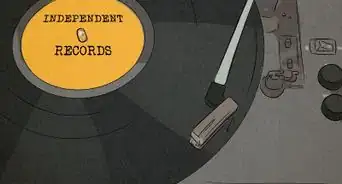This article was co-authored by wikiHow Staff. Our trained team of editors and researchers validate articles for accuracy and comprehensiveness. wikiHow's Content Management Team carefully monitors the work from our editorial staff to ensure that each article is backed by trusted research and meets our high quality standards.
This article has been viewed 19,135 times.
Learn more...
Careers at recording studios are highly competitive and difficult to land. These positions require a passion for music and the willingness to work long hours. Along with that passion and work ethic, you may need to take a position such as intern or runner in order to break into the industry. If you have technical and artistic ability, enjoy learning, and don't mind hard work, a job at a recording studio may be right for you!
Steps
Reviewing the Challenges
-
1Be friendly and adaptable. Working at a recording studio requires a passion for music and the ability to adapt quickly to new technology.[1] You should be able to get along well with others and work on a team. You'll also need to be able to convert input from producers and musicians into results that are both technical and provoke an emotional response.[2]
- Working at a recording studio requires both technical and artistic skills.
-
2Be willing to work long hours. Consider how much time you're willing to sacrifice for this career. You'll need to be willing to work late into the night, get a few hours of sleep, and return to work in the morning.[3] Twelve-hour shifts aren't uncommon, even on the weekends.[4]
- If you're career-driven and don't mind working long hours, this may be a fit for you.
- If you plan to get married or start a family soon, working at a recording studio is probably not your best option.
Advertisement -
3Realize you may have to start at the bottom. Save money, if possible, since the lower positions may pay little to nothing.[5] Some entry-level positions include intern, cleaner, receptionist, and runner.
- Working as a cleaner can help you make connections and demonstrate your work ethic.
- A lot of studios require assistants to work for a year as a receptionist as an introduction to the business.
-
4Be willing to relocate for an available position. Look for open positions outside your local area. Indicate on your online resume that you're willing to relocate for the right position.[6]
- Recording studio positions are competitive and hard to get. You'll increase your likelihood of landing a job if you're willing to relocate.
Gaining Experience
-
1Obtain a certificate or degree, if desired. A degree is not always a requirement; you may choose to go the apprenticeship route instead. However, obtaining a degree shows your ability to meet challenges and follow through, and gives you some experience in sound engineering. Try looking at trade schools specifically in the music industry.[7]
- For example, you may want to obtain an Audio Production degree or a Recording Arts Bachelor of Science degree from a university. Alternately, you may obtain a certificate in Audio Recording and Production from a technical school.
- Some schools offer job placement upon completion of a program.
- Even if you obtain a certificate or degree, you'll probably still need to start working at a low position.
-
2Join an engineering organization. Gain networking and education opportunities by becoming a member. Attend meetings and offer your assistance.[8]
- For example, you may want to join the Audio Engineering Society (AES), and/or The Society of Professional Audio Recording Services (SPARS).
-
3Look for an internship. Be aware that you may be doing menial tasks, such as making coffee, preparing food or sweeping. Look for an internship that's more than just a few hours a day.[9]
- If the internship is just three to four hours a day, you're less likely to get valuable on-the-job training.
- Not all internships are paid. However, an internship position may help you to secure a paid position as an assistant or runner down the line.
-
4Volunteer your services. Look for music awards shows or tech expos that accept volunteers. Check with local churches and audio/technical organizations that accept volunteers. Let people know that you're looking for an entry level position, and offer your information.[10]
-
5Consider working as a runner. This can get your foot in the door so you can work your way up to becoming an assistant engineer, and eventually an engineer.[11]
- Runner is the lowest position for an engineer. You'll perform basic tasks, such as preparing lunch, to help out while you're still learning.
-
6Create a resume and cover letter. A good cover letter is essential. Check your resume and cover letter thoroughly for spelling and grammar.[12] Include the appropriate framework in your resume.[13]
- For example, include your contact information, work experience, accomplishments, skills and education.
- Try looking at some examples online of engineering resumes to get an idea of how to add detail to the focus of your resume.
Being a Good Employee
-
1Prioritize working over chatting. Try to limit chatting to asking important questions that will help you understand your tasks. Observe how your mentors are doing their jobs, particularly the recording engineer, record producer, and mastering engineer.[14]
-
2
-
3Learn and share generously. Great sound engineers tend to be people pleasers. Techniques evolve and change, so you'll also need to be a lifetime learner. Share what you learn with your peers willingly, when asked.[17]
- These characteristics are shared by highly successful mixing engineers.
References
- ↑ http://modernmixing.com/blog/2014/05/07/characteristics-of-highly-successful-mixing-engineers/
- ↑ https://www.careersinmusic.com/recording-engineer/
- ↑ https://www.recordingconnection.com/reference-library/recording-entrepreneurs/life-as-a-recording-engineer/
- ↑ https://www.careersinmusic.com/sound-technician/
- ↑ https://www.careersinmusic.com/recording-engineer/
- ↑ https://www.careersinmusic.com/recording-engineer/
- ↑ https://www.careersinmusic.com/recording-engineer/
- ↑ https://www.careersinmusic.com/recording-engineer/
- ↑ https://www.careersinmusic.com/recording-engineer/
- ↑ https://www.careersinmusic.com/recording-engineer/
- ↑ https://www.careersinmusic.com/recording-engineer/
- ↑ https://www.careersinmusic.com/recording-engineer/
- ↑ https://www.livecareer.com/resume-samples/engineering-resumes#include_in_resume
- ↑ https://www.careersinmusic.com/recording-engineer/
- ↑ https://www.careersinmusic.com/recording-engineer/
- ↑ http://blog.theblackbirdacademy.com/blog/4-thoughts-to-adopt-to-be-successful-in-audio-engineering
- ↑ http://modernmixing.com/blog/2014/05/07/characteristics-of-highly-successful-mixing-engineers/




































































